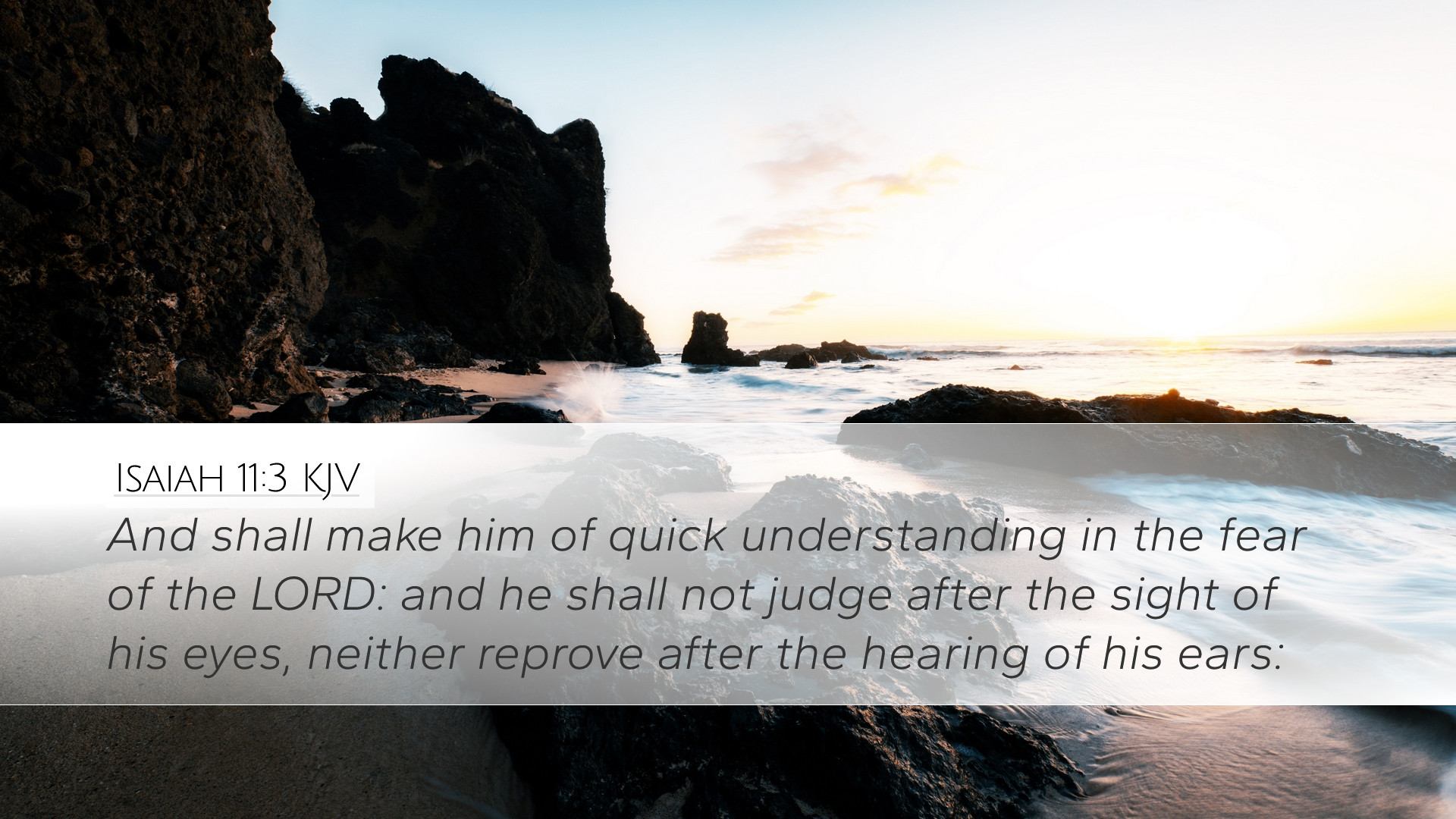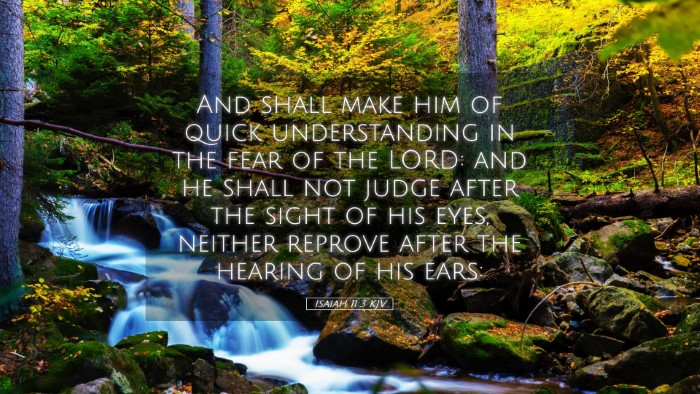Commentary on Isaiah 11:3
Isaiah 11:3: “And shall make him of quick understanding in the fear of the Lord: and he shall not judge after the sight of his eyes, neither reprove after the hearing of his ears.”
Context and Themes
The prophecy in Isaiah 11:3 forms part of a larger vision of a Messianic figure who embodies divine wisdom and justice. The chapter speaks of the coming of a Branch from the root of Jesse, who will reign with righteousness. Here, the focus is particularly on the qualities of this anticipated Messiah, emphasizing His discernment and commitment to God's will.
Insights from Matthew Henry
Matthew Henry highlights the significance of “quick understanding in the fear of the Lord” as an essential trait of the Messiah. He stresses that this understanding goes beyond mere human wisdom, rooted instead in a profound reverence for God. This aspect assures believers that the judgment of the Messiah will be perfect, as His decisions originate from a heart aligned with the divine will.
- Fear of the Lord: According to Henry, it is through the fear of the Lord that the Messiah will comprehend all matters. This reverence for God governs not only His judgments but also His actions, aligning them with divine purpose.
- Judgment not by superficial means: Henry emphasizes the distinction that the Messiah does not rely solely on external observations (“the sight of his eyes”) or hearsay (“the hearing of his ears”). Instead, His judgments will be based on a divine understanding that sees beyond appearances and hears the truth that lies beneath human speech.
Insights from Albert Barnes
Albert Barnes presents a detailed analysis of the phrase “quick understanding,” noting its connection to the concept of being filled with the Spirit of God. He interprets this as indicative of the Messiah’s ability to perceive truth and righteousness deeply and instantaneously.
- Spiritual Guidance: Barnes suggests that the quick understanding mentioned reflects the empowerment of the Holy Spirit in the Messiah’s life. This empowerment enables Him to discern right from wrong beyond human capabilities.
- Holistic Approach to Judgment: The rejection of judgment based on sight or hearing suggests that true judgment requires more than just sensory information; it requires insight, wisdom, and an understanding of the heart of individuals and the context of situations.
Insights from Adam Clarke
Adam Clarke addresses the nature of the Messiah’s qualities elaborated in this verse. He points out that “quick understanding” symbolizes not just rapidity but depth and clarity in spiritual discernment.
- Divine Knowledge: Clarke underscores that this knowledge is distinct from human understanding, which is often clouded by biases and limited perspective. The Messiah possesses an unblemished understanding of God’s law and the hearts of men.
- Non-Conformity to Human Judgment: By stating that He shall not judge “after the sight of his eyes,” Clarke reinforces the notion that the Messiah operates in a realm far beyond that of human appearances and societal norms.
Theological Implications
The insights from these commentators converge on several key theological themes relevant for pastors, students, and theologians:
- Hope in the Messiah: This verse speaks profoundly to the hope that the Messianic figure embodies. The qualities described point to a ruler who will bring equity and justice, establishing a kingdom characterized by divine wisdom.
- Christological Interpretation: In Christian theology, this passage is often seen as a direct prophecy of Jesus Christ, who fulfilled these characteristics. His life and ministry exemplified perfect understanding and justice, fulfilling the promise of Isaiah.
- Call to Discernment: The mention of the Messiah’s quick understanding invites believers to cultivate similar qualities in their own lives. In a world rife with deception and falsehood, the call is to seek wisdom and understanding rooted in the fear of the Lord.
Practical Applications
Reflecting on Isaiah 11:3 offers several practical applications for contemporary believers:
- Embrace the Fear of the Lord: Believers are encouraged to cultivate a deep reverence for God, which leads to insights and understanding that surpass human wisdom.
- Develop Spiritual Discernment: Just as the Messiah judged not by sight or sound, believers are challenged to look beyond appearances and seek deeper truths in their judgment and interactions with others.
- Reflect Christ's Character: As followers of Christ, there is a calling to emulate His qualities of justice, wisdom, and understanding in their own lives and communities.
Conclusion
The richness of Isaiah 11:3 calls forth a profound understanding of the nature of the Messiah and sets a standard for the qualities believers should strive to embody. Through insights from Matthew Henry, Albert Barnes, and Adam Clarke, this commentary encapsulates the depth required in navigating governance, judgment, and spiritual maturation in alignment with divine wisdom.


